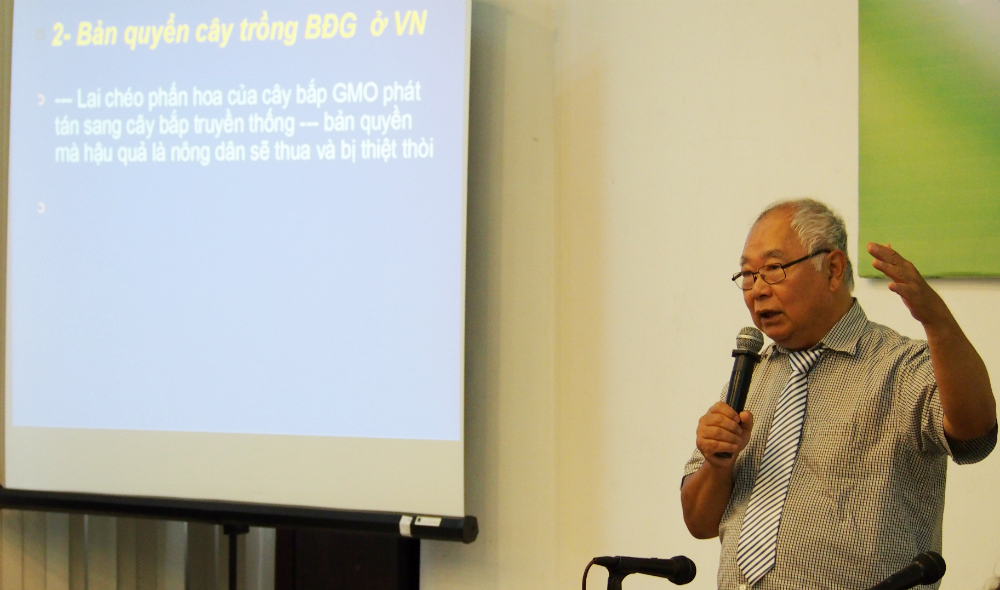Though initially cultivated to curb famine due to higher yields, the production of genetically modified organisms (GMOs) in the U.S. has been similar to that of conventional crops in the latest two decades, a Vietnamese-German expert said at a recent seminar in Ho Chi Minh City.
>> An audio version of the story is available here
GMOs were developed in the past in the hope of coping with an increase in the world’s population, which is projected to have reached nine billion by 2050, Trang Quang Sen, who earned a PhD in genetics in Germany, said at the “Will GMOs be the Future Source of Food?” seminar on Thursday last week, citing a report by the U.S. Department of Agriculture.
Statistics by the department showed that the total yield of GMOs has been 1.2 percent higher than the production of conventional crops for the past 15 years, Sen said.
The current supply of food, mostly from conventional crops, outstrips demand, Sen said, citing a report by the Food and Agriculture Organization (FAO) under the United Nations.
About 40-45 percent of food is discarded due to spoilage or expiry, or for cutting supply to help maintain prices, he added, using the same FAO data as the basis.
Famine has occurred in many countries as a result of the incompetence in food distribution and management of local authorities and businesses, according to the expert.
“In my opinion, GMOs cannot be considered the future of food for human beings,” he said.
According to the International Service for the Acquisition of Agri-biotech Applications (ISAAA), the area of genetically modified crops in the world was 181 million hectares in 2014, accounting for 12.9 percent of arable land (1.4 billion hectares).
Traditional crops are still planted on 87.1 percent of arable land in the world, he said.
The majority of GM crops are grown in North America and Latin America with 82.8 percent in total, led by the United States with 40 percent, Brazil 23 percent, Argentina 13.4 percent, and Canada 6.4 percent.
Europe, except Spain, has 131,537 hectares, equivalent to 0.09 percent, while the remaining countries have negligible GMO crops.
If Vietnam wants to grow GMOs, as already permitted by the Ministry of Agriculture and Rural Development, there are many things to pay attention to, Sen said.
In April, the Ministry of Agriculture and Rural Development gave the go-ahead for two foreign companies to distribute GM corn and seeds in the country, including U.S.-based DeKalb Genetics Corporation and Syngenta Vietnam.
DeKalb is a subsidiary of the world’s largest seed provider Monsanto, whereas Syngenta Vietnam is a localized unit of Syngenta, a global Swiss agribusiness that markets seeds and agrochemicals.
According to global regulations, the pollen of GM corn is not allowed to be transferred to conventional crops by any means, including natural ways like wind or insects.
The Vietnamese-German pundit said if conventional maize grown near a GMO farm of maize is found containing the genes which can only be found in genetically modified plants, the farmers will be sued, and will likely lose in this case.
Meanwhile, GM seeds cannot be reused for the next crop, and farmers have to buy new plants if they want to start a new crop, raising the dependence on foreign suppliers.
As the EU and Japan, two of the biggest export markets of Vietnam, do not accept GM food or any kind of food products containing GM elements, Vietnam will possibly lose the two important markets if GMOs become popular, Sen warned.
Another problem for GM food available for sale in Vietnam is labeling, as many such products lack detailed labels, he said.
In Germany, products made from GMOs with a proportion of 0.9 percent must have labels indicating where they are sourced.
Meanwhile, Vietnam regulates a ratio of five percent, the same as that in many other countries.
However, many GMO-related products on the local market do not bear such kinds of labeling, many participants said at the seminar.
Most soybeans on sale in Vietnam are imported, and the biggest supplier of soybeans is the U.S., where the majority of soy farming areas are GMOs, they said.
Like us on Facebook or follow us on Twitter to get the latest news about Vietnam!



















































